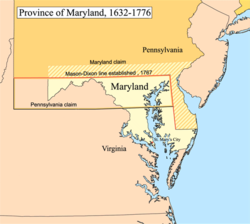Colony of Maryland
| Province of Maryland | ||||||||
| Colony of England (1632–1707) Colony of Great Britain (1707–76) |
||||||||
|
||||||||
|
A map of the Province of Maryland.
|
||||||||
| Capital |
St. Mary's City (1632–95) Annapolis (from 1695) |
|||||||
| Languages | English, Susquehannock, Nanticoke, Piscataway | |||||||
| Government | Constitutional monarchy | |||||||
| Royally Chartered Proprietor | ||||||||
| • | 1632–1675 | Lord Baltimore, 2nd | ||||||
| • | 1751–1776 | Lord Baltimore, 6th | ||||||
| Proprietary Governor | ||||||||
| • | 1634–1647 | Leonard Calvert | ||||||
| • | 1769–1776 | Robert Eden | ||||||
| Legislature | Maryland General Assembly | |||||||
| History | ||||||||
| • | Charter granted | 1632 | ||||||
| • | Independence | July 4, 1776 | ||||||
| Currency | Pound sterling | |||||||
|
||||||||
| Today part of |
|
|||||||
The Province of Maryland was an English and later British colony in North America that existed from 1632 until 1776, when it joined the other twelve of the Thirteen Colonies in rebellion against Great Britain and became the U.S. state of Maryland. Its first settlement and capital was St. Mary's City, in the southern end of St. Mary's County, which is a peninsula in the Chesapeake Bay and is also bordered by four tidal rivers.
The province began as a proprietary colony of the English Lord Baltimore, who wished to create a haven for English Catholics in the new world at the time of the European wars of religion. Although Maryland was an early pioneer of religious toleration in the English colonies, religious strife among Anglicans, Puritans, Catholics, and Quakers was common in the early years, and Puritan rebels briefly seized control of the province. In 1689, the year following the Glorious Revolution, John Coode led a rebellion that removed Lord Baltimore from power in Maryland. Power in the colony was restored to the Baltimore family in 1715 when Charles Calvert, 5th Baron Baltimore, insisted in public that he was a Protestant.
...
Wikipedia


